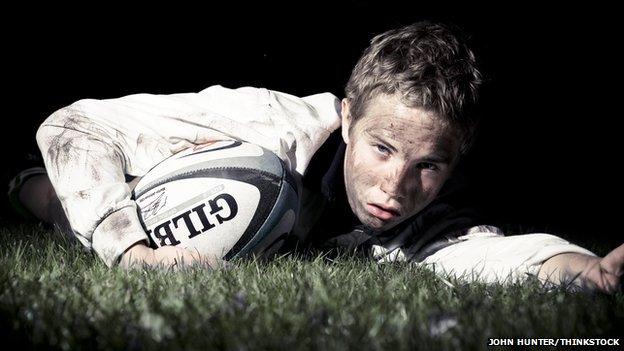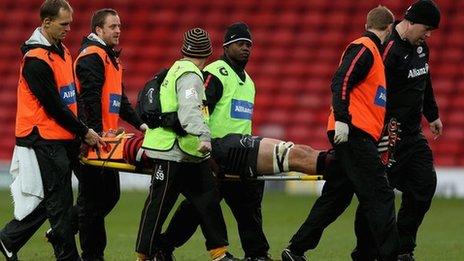School rugby plan 'too dangerous'
- Published

A government drive to boost participation in rugby in English schools is ill-conceived and risks children getting seriously hurt, public health doctors have warned.
Prof Allyson Pollock and colleagues at Queen Mary University of London say the contact sport is too dangerous.
They do not want an outright ban but say the sport must change and safeguards are needed.
The Rugby Football Union said steps had been taken to make the sport safer.
The RFU says the physical and social benefits that rugby offers to children "massively outweigh any potential drawbacks" and that myriad safety measures are already in place.
These include the provision of a safe environment through investment in pitches and facilities, ensuring adequate first aid and medical facilities, and fully training coaches in methods to prevent injuries to young players.
Ministers also want to see more children taking up sport.
In 2012, then Culture Minister Jeremy Hunt announced a plan to link up thousands of schools with rugby clubs, external.
But Prof Pollock fears there are not enough safety checks and measures to support this, meaning children could get hurt. She wants to see an increase in the recording of injuries and better injury prevention analysis. She claims that, compared with New Zealand, the UK has few strategies to protect players.
Contact sport

Each season, children have about a one in 10 chance, external of getting injured badly enough that they need at least seven days off the pitch.
Some injuries are minor, but others can cause permanent disability.
Most rugby injuries occur during the tackle, as players collide at speed.
But scrums are the most dangerous part of play, where some of the most serious injuries occur, Prof Pollock and colleagues say in their report in the British Medical Journal, external.
Concussion and spinal trauma are the big concerns.
Some injuries can prove fatal - as the Robinson family from County Antrim know only too well after their 14-year-old son, Ben, died having been hurt in a school rugby match in 2011.
He collapsed at the end of that match after he was involved in a series of heavy tackles. An inquest heard that the teenager died from brain injuries.
Prof Pollock says not enough is being done to put in place injury monitoring and prevention strategies - and little is known about what really works.
Safety first
"Only by collecting injury data and by providing feedback to individuals and organisations working on safety initiatives will the short - and long-term impact of injury prevention programmes, whether for rugby or any other sport, be known," she said.
She added some measures - such as matching child rugby players by size rather than age, playing only non-contact matches and having fewer players on the pitch at any one time - may help reduce the frequency of the most severe injuries.
The RFU says set-phase play such as scrums and line-outs are introduced gradually, according to a child's rugby development, with scrums initially only containing three players per side and are uncontested.
An RFU spokesman said: "We take player safety extremely seriously, and this is at the core of all the training we deliver to coaches, referees and medics, at all levels of the game.
"Rugby for young people at schools or clubs in England exists in different forms, both contact and non-contact.
"Significant work has been undertaken over a number of years to develop new rules of play to ensure maximum possible safety, with a structured progression to cover the introduction, playing, teaching and refereeing of the game from under-seven to under-18."
A government spokesman said: "Player safety in schools and at all levels of sport is absolutely paramount and sports governing bodies and the government are completely committed to it.
"The rugby governing bodies work hard to ensure the sport in schools is played as safely as possible and that young people reap the benefits of participating - boosting their health, self-esteem and encouraging teamwork."
- Attribution
- Published12 February 2015

- Published3 September 2013
